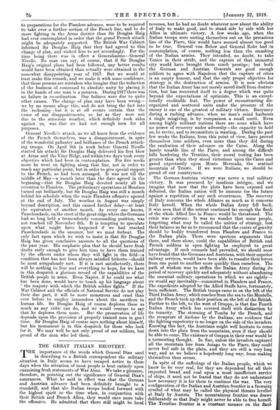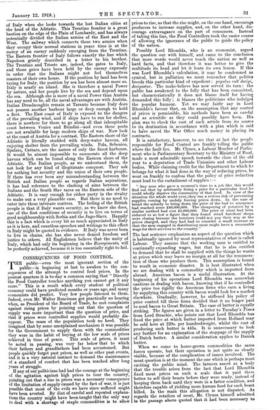THE GREAT ITALIAN RECOVERY. T HE importance of the words which
General Diaz used in describing to a British correspondent the military situation in Italy seems to have escaped notice in these days when the attention of most people is bent entirely upon examining fresh statements of War Aims. We take a pleasure, therefore, in pointing out the significance of General Diaz's assurances. What he said in effect was that the German and Austrian advance had been definitely brought to a standstill, and that the Italian troops looked forward with the highest spirit to the time when, in conjunction with their British and French Allies, they would once more take the offensive. He admitted that there still might be local reverses, but he had no doubt whatever now about the ability of Italy to make good, and to stand side by side with her Allies in ultimate victory. A few weeks ago, when the Italian troops were sorting themselves out on the precarious line of the Piave, this would have seemed almost too good to be true. General von Below and General Rohr had in contemplation, of course, nothing less than the smashing of the Italian armies. They intended, no doubt, to take Venice in their stride, and the capture of that immortal city would have brought them much prestige ; but both the - German and Austrian Generals are good enough soldiers to agree with Napoleon that the capture of cities is an empty honour, and that the only proper objective for strategy is the destruction of armies. It is now obvious that the Italian Army has not merely saved itself from destruc- tion, but has recovered itself to a degree which was quite beyond the expectations of optimists. This is an except- ionally creditable feat. The power of reconstructing dis- organized and scattered units under the pressure of the enemy is one of the greatest of military virtues. Buoyancy during a rushing advance, when no man's mind harbours a single misgiving, is by comparison a small merit. Even among highly militant nations there are some which have no power of recovery under adversity—the capacity to hold on, to revive, and to reconstitute is wanting. During the past few weeks the Italians, from this point of view, have proved themselves true soldiers, even more than they did during the exultation of their advance on the Carso. Alo the barely tenable line of the Piave, and among the h cult hills bordering the Trentino, their moral testing has been greater than when they stood victorious upon the Carso and gazed expectantly upon Monte Hermada, the sentinel mountain of Trieste. If we were Italians, we should be proud of our countrymen.
The German-Austrian victory was never a real military victory. It was procured by insidious intrigue, and we imagine that now that the plots have been exposed and defeated, the Italian nation will be immune for the future against a repetition of any such occurrences. The recovery of Italy concerns the whole Alliance as much as it concerns Italy herself. When the whole Italian Army fell back, it was seen that if the retreat continued far enough the flank of the whole Allied line in France would be threatened. The crisis was extreme. It was no wonder that some people, forgetting what may be called the unities of strategy, lost their balance so far as to recommend that the centre of gravity should be bodily transferred from Flanders and France to the Italian plain. There were specious arguments that there, and there alone, could the capabilities of British and French soldiers in open fighting be employed to great advantage. If such counsels had prevailed, we should soon have found that the Germans and Austrians, with their superior railway services, would have been able to transfer their forces from one point to another more quickly than ourselves. The path of wisdom was to stiffen the Italian Army during its period of recovery quickly and adequately without abandoning the essential military operations to which we are rightly— we would say inevitably—committed in Flanders and France. The expedients adopted by the Allied Staffs have, fortunately, been sufficient. The British troops came in on the left of the Third Italian Army, which reaches from the sea to the Montello, and the French took up their position on the left of the British. Further to the left, to the west of Grappa, is that fine Fourth Italian Army which has covered itself with distinction by its tenacity. The storming of Tombs by the French, and the recapture of Asolone by the Italians, are evidence that the fighting superiority is no longer on the side of the invaders. Knowing this fact, the Austrians might well hesitate to come down into the plain from the mountains, even if they should be able to come. The existence of Grappa in their rear would be a tormenting thought. In fine, unless the invaders captured all the mountain line from Asiago to the Piave, they could never feel safe in the plain, and they are still a very long way, and as we believe a hopelessly long way, from making themselves thus secure.
In spite of the sufferings of the Italian people, which we know to be very real, for they are dependent for all their imported bread and coal upon a most insufficient service of ships, it need not be feared that they do not understand how necessary it is for them to continue the war. The very configuration of the Italian and Austrian frontier is a frowning symbol of what may be called the physical threats levelled at. Italy by Austria. The mountainous frontier was drawn deliberately so that Italy might never be able to free herself, The Trentino frontier is a constant - menace on the flanli of Italy when she looks towards the lost Italian cities at the head of the Adriatic. This Trentino frontier is a great bastion on the edge of the Plain of Lombardy, and has always potentially divided the Italian armies of the East and the West. The railway which connects these two armies when they occupy their normal stations in peace time is at the mercy of an enemy suddenly emerging from the Trentino. The Eastern frontier of Italy follows exactly the line which Napoleon grimly described in a letter to his brother. The Trentino and Trieste are, indeed, the gates to Italy, and those gates have been held by the enemy expressly in order that the Italians might not feel themselves masters of their own house. If the position by land has been trying for Italy, the position by sea has been almost more so. Italy is nearly an island. She is therefore a naval Power by nature, and her people live by the sea and depend upon the sea. Although she is more of a naval Power than Austria has any need to be, all the naval advantages are with Austria. Italian Dreadnoughts remain at Taranto because Italy does not possess another 'harbour large or deep enough to hold a fleet. The East coast of Italy is exposed to the dangers of the prevailing wind, and if ships have to run for shelter, there is nowhere for them to go along all that inhospitable coast between Venice and Brindisi—and even these ports are not available for large modern ships of war. Now look at the coast of Austria for a contrast. The Eastern shore of the Adriatic is literally studded with deep-water havens, all enjoying shelter from the prevailing winds. Pola, Sebenico, Spalato, Cattaro, are the names of only the finest harbours. It would be almost impossible to enumerate all the deep havens which can be found along the Eastern shore of the Adriatic. The Italian people, as we understand them, do not look for any kind of illegitimate conquest. They ask for nothing but security and the union of their own people. If there has ever been any misunderstanding between the British and Italian people as regards Italian aspirations, it has had reference to the clashing of aims between the Italians and the South Slav races on the Eastern side of the Adriatic. It is easy enough for either party in the rivalry to make out a very plausible case. But there is no need to enter into these intricate matters. The feeling of the British people is that if Italy wants security, as we know she does, one of the first conditions of security is to live on terms of good neighbourship with Serbia and the Jugo-Slays. Happily this is a fact which is every bit as much appreciated in Italy as it is here, and countless speeches and writings to this effect in Italy might be quoted in evidence. If Italy was never born to live in chains, she has also never denied freedom and justice to others. All Englishmen believe that the unity of Italy, which had only its beginning in the Risorgintento, will be perfectly achieved, because it is too essentially right to fail.



























 Previous page
Previous page